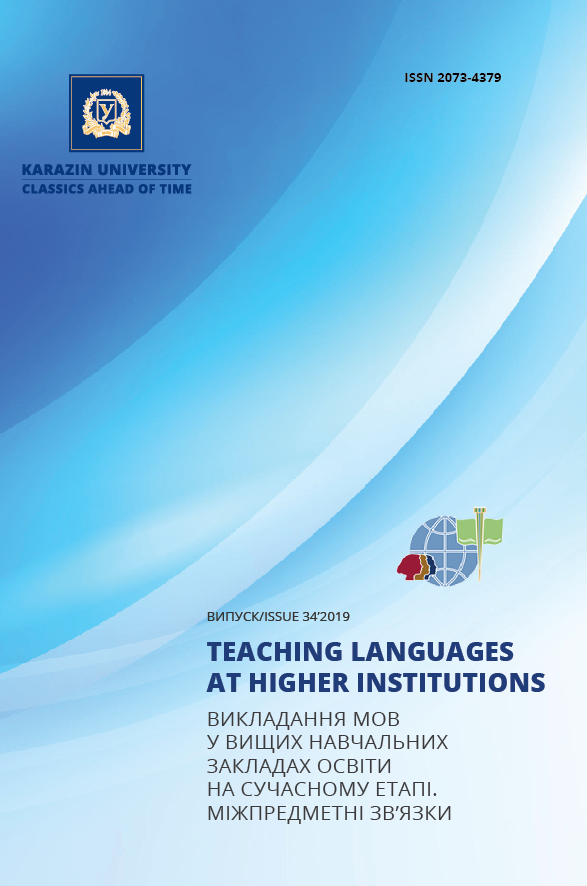Communicative training as a means of forming the readiness of a language personality to speech interaction
Abstract
The article is devoted to communicative training as a means of forming the readiness of the linguistic personality for speech interaction. Revealed the relevance of the work, which is the development of special training tools for intercultural communication. Achieved work goal. The main type of preparation for intercultural communication, focused on practical interaction with another culture, is training. Prospects for further research lie in the development of methodological foundations of communication trainings in order to shape the readiness of the linguistic personality to speech interaction.
The communicative training consists of stages such as task setting; actualization of students' language experience; the formation of the representation of the Indonesians about the scenarios of Ukrainian etiquette interaction, familiarization with etiquette forms that function in Ukrainian culture, with the common strategies and tactics of speech behavior in a variety of etiquette situations; recognition and analysis of etiquette formulas in authentic texts; training the ability to correct the speech behavior; reflection. In the article we give examples to the stages of communicative training the work on the genre of compliment.
The first stage of the training is to inform students about the topic of the lesson and the teacher's message about the notion of "compliment" and the national specificity of the compliment in Ukrainian culture. The second stage is the formation of the students presentation about the rules of using the compliment in the Ukrainian culture. The third stage of the training is the solution of communication tasks and exercises built on the basis of authentic texts, for example, the teacher can use the broadcast recordings of participants of radio and television programs, heroes of feature films, spoken speech of the speakers of the language. The fourth stage of the communicative training is the organization of reflection, which consists of reflection, self-observation, the desire to understand their own feelings and actions.
Downloads
References
Azimov, E.G. and Schukin, A.N. (2009). Novyiy slovar metodicheskih terminov i ponyatiy (teoriya i praktika obucheniya yazyikam) [A New Dictionary of Methodological Terms and Concepts (theory and practice of teaching languages)]. M.: IKAR Publishing House [in Russian].
Bogdan, S. (1998). Movny etiket ukraintsіv: tradition і sisachasnіst [Language etiquette of the Ukrainians: traditions and modernity]. K.: “Rіdna Mova” [in Ukrainian].
Burnard, F. (2002). Trening mezhlichnostnogo vzaimodeystviya [Training interpersonal interaction]. Saint Petersburg: Peter [in Russian].
Krovitska, O. (2005). Ukrainska leksykohrafiia: teoriia i praktyka [Ukrainian lexicography: theory and practice]. Lviv [in Ukrainian].
Ovchinnikova, I.S. and Kobzeva, N.A. (2015). Trening kak tehnologiya aktivnogo obucheniya [Training as a technology of active teaching/learning]. Molodoy uchenyiy [Young scientist], 10, pp. 1239−1241 [in Russian].
Shulga, I. (2016). Treninh iz inozemnoi movy profesiinoho spriamuvannia dlia studentiv i kursu nemovnykh spetsialnostei [Professional language training from the foreign language for undergraduate students in non-language specialties]. Pedahohichni nauky: teoriia, istoriia, innovatsiini tekhnolohii [Pedagogical sciences: theory, history, innovative technologies], 5 (59), pp. 244−252 [in Ukrainian].
Sidorov, S.V. Trening kak forma aktivnogo obucheniya [Training as a form of active learning]. Sayt pedagoga-issledovatelya [The site of the teacher-researcher]. Available at: http://si-sv.com/publ/14–1-0–387 [Accessed April 15, 2019] [in Russian].
Zakharova G.I. (2008). Teoriya i metodika psihologicheskogo treninga [Theory and methods of psychological training]. Available at: http://myakushkin.ru/pdf/THEORY_AND_METHODS_OF_PSYCHOLOGICAL_TRAINING.pdf [Accessed April 15, 2019] [in Russian].
Zubec, N. (2015). Prahmatyka komplimentnoho aktu movlennia [Pragmatics of a complimenting speech]. Naukovyi visnyk Khersonskoho derzhavnoho universytetu [Scientific Bulletin of Kherson State University], 22, pp. 142–147 [in Ukrainian].

